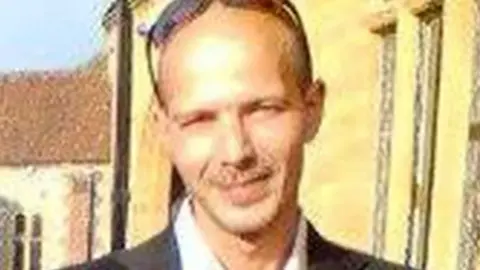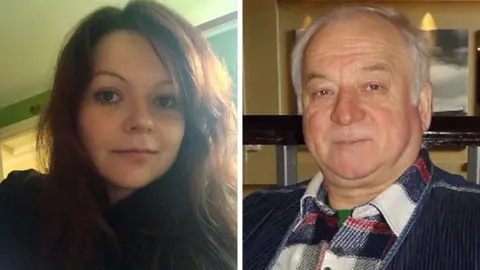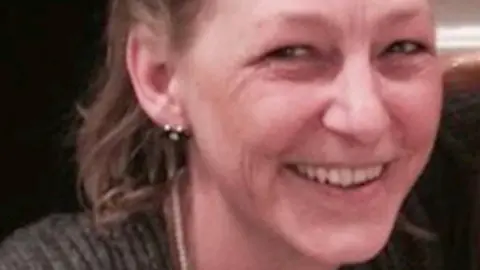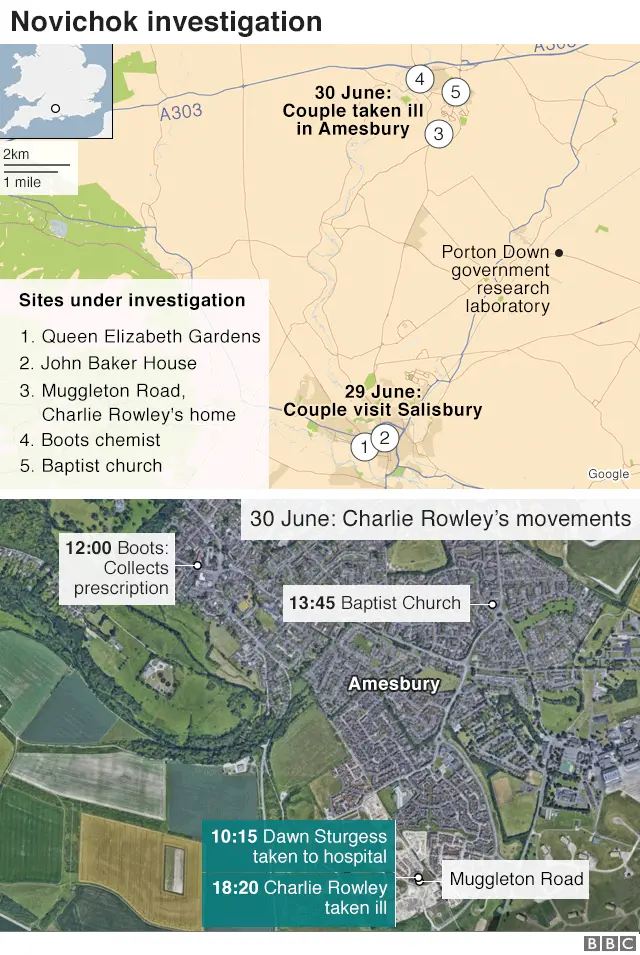Novichok victim Charlie Rowley leaves hospital
 AFP
AFPNovichok victim Charlie Rowley has been discharged from hospital, three weeks after being exposed to the nerve agent.
Salisbury District Hospital said he had been through an "appalling experience most of us could never imagine".
Mr Rowley, 45, and his partner Dawn Sturgess, 44, collapsed at his house in Amesbury, Wiltshire, on 30 June, where police found a bottle containing the nerve agent.
Ms Sturgess later died on 8 July and a murder inquiry has been launched.
Lorna Wilkinson, Salisbury District Hospital's director of nursing, said the day was "tinged with sadness" after the death of Ms Sturgess.
"We continue to think both of Charlie and of Dawn's family, and support them as they go through the difficult process of coming to terms with her death," she said.
Ms Wilkinson added that Mr Rowley had been decontaminated to ensure the nerve agent could no longer affect him or anyone who comes into contact with him.
There have only been five victims of Novichok poisoning to be treated at Salisbury District Hospital, she said.
Public Health England's medical director Paul Cosford said Mr Rowley's discharge from hospital "creates no risk to anyone in the community".
He reiterated that the public should not pick up items such as syringes, needles, cosmetics or objects made of plastic, metal, or glass.
Wiltshire Police said it would "continue to coordinate activity at a local level to ensure that Mr Rowley continues to receive the support he needs in his ongoing recovery".

The poisoning is thought to be linked to the attack on Russian ex-spy Sergei Skripal and his daughter Yulia, who were discovered slumped on a bench on 4 March in nearby Salisbury.
They have since been discharged from hospital.
The UK government has blamed Russia for the incident, but the country's authorities deny any involvement.
 Metropolitan Police
Metropolitan PoliceMr Rowley's brother Matthew has said his sibling picked up a perfume bottle containing the toxic substance.
The Metropolitan Police, which is leading the investigation, refused to confirm the claim but the force had previously said the substance was found in a "small bottle".
On Thursday, a coroner's inquest was opened and adjourned for mother-of-three Ms Sturgess.
Her sister Stephanie told the hearing she was present when doctors informed her of the decision to switch off her sibling's life support.
"I then said my goodbyes to Dawn before leaving hospital," she said.
Ms Sturgess lived in Salisbury, and the couple had been in the city before going to Mr Rowley's flat in nearby Amesbury on Friday 29 June.
They both then fell ill on Saturday 30 June, and Ms Sturgess died eight days later.
Counter-terrorism police are investigating five sites in Salisbury and Amesbury, in an attempt to identify where the couple came into contact with the nerve agent.


On Wednesday, international chemical weapons experts completed their investigations in Amesbury, where they sought to identify whether the substance that poisoned the couple was from the same batch used against the Skripals.
The Organisation for the Prohibition of Chemical Weapons (OPCW) will analyse the substance before reporting back its conclusions.
Police are believed to have identified the perpetrators of the Novichok poisoning on the Skripals, according to Press Association sources.
The news agency reported several Russians were thought to be involved in their attempted murder in Salisbury.
They are believed to have been identified through CCTV, cross-checked with border entry data.
The Met Police, which is leading the investigation, and the Home Office have both declined to comment.
The BBC has not been able to independently confirm the story.
